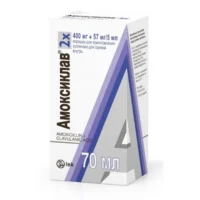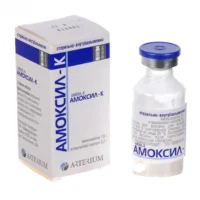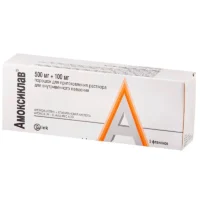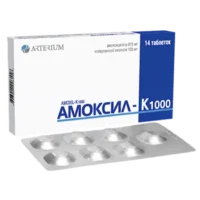Description
Fromilid Coated Tablets 250 mg. №14
Ingredients
Each coated tablet contains 250 mg of clarithromycin.
Mechanism of Action
Clarithromycin, a macrolide antibiotic, exerts its bacteriostatic effect by binding to the 50S ribosomal subunit of susceptible bacteria, thus inhibiting protein synthesis and ultimately leading to bacterial cell death.
Pharmacological Properties
Fromilid tablets containing clarithromycin demonstrate broad-spectrum antibacterial activity against various pathogens, making it effective in treating respiratory tract infections, skin and soft tissue infections, and Helicobacter pylori eradication.
Indications for Use
- Treatment of respiratory tract infections
- Management of skin and soft tissue infections
- Eradication of Helicobacter pylori
Contraindications
Avoid the use of Fromilid tablets if you have a known allergy to clarithromycin or other macrolide antibiotics. Caution is advised in patients with a history of cholestatic jaundice or hepatic dysfunction associated with prior clarithromycin use.
Side Effects
Common side effects of Fromilid may include nausea, diarrhea, abdominal pain, and dysgeusia. Rare but serious adverse reactions such as hepatotoxicity, QT prolongation, and Clostridium difficile-associated diarrhea have been reported.
Usage Instructions
The recommended dosage for adults is one 250 mg tablet of Fromilid twice daily. It is advisable to take the tablets with food to minimize the risk of gastrointestinal disturbances.
Benefits Compared to Analogues
Fromilid offers the advantage of a convenient twice-daily dosing regimen and a favorable safety profile compared to other macrolide antibiotics. Its broad spectrum of activity makes it a versatile choice for various bacterial infections.
Suitable Patient Groups
Fromilid is suitable for use in both adult and pediatric populations. Dosing adjustments may be necessary in elderly patients or those with renal impairment to prevent drug accumulation and potential toxicity.
Storage and Shelf Life
Store Fromilid tablets in a cool, dry place away from direct sunlight. Ensure proper sealing of the packaging to protect the tablets from moisture. Check the expiration date on the packaging and do not use the tablets beyond the stated shelf life.
Packaging Description
Fromilid Coated Tablets 250 mg are available in blister packs containing 14 tablets. Each tablet is film-coated for easy swallowing and protection of the active ingredient.
Clinical Evidence and Proven Effectiveness
Clarithromycin, the key component of Fromilid tablets, has been extensively studied and demonstrated efficacy in the treatment of various bacterial infections. Notably, research published in the Journal of Antimicrobial Chemotherapy highlighted the effectiveness of clarithromycin in combating respiratory infections.





